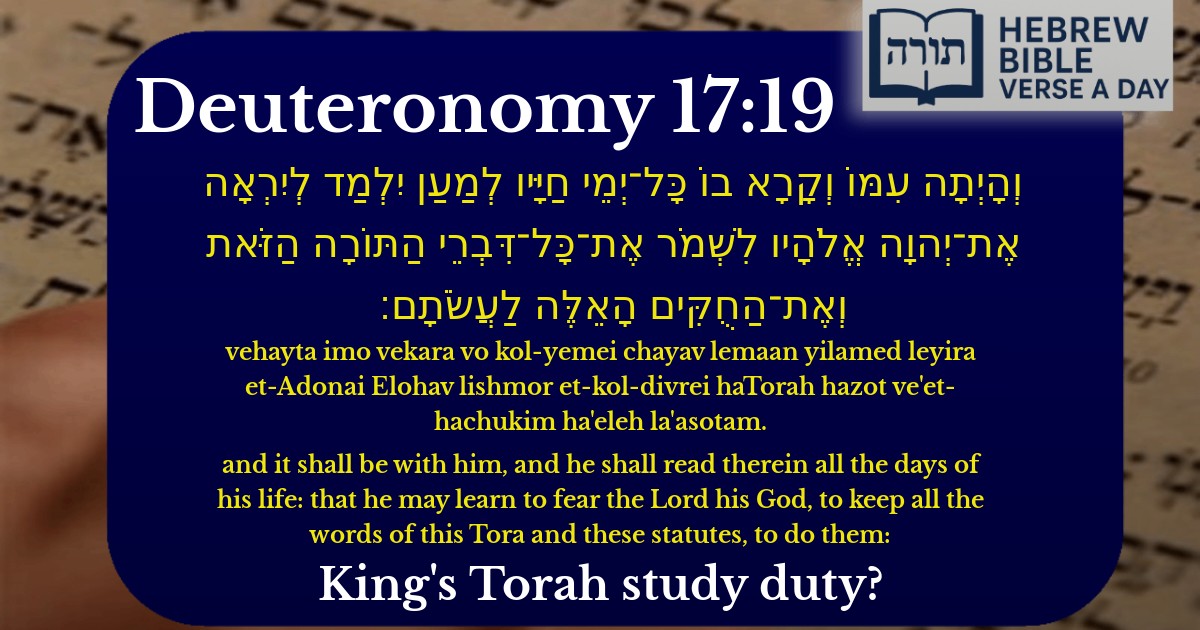Join Our Newsletter To Be Informed When New Videos Are Posted
Join the thousands of fellow Studends who rely on our videos to learn how to read the bible in Hebrew for free!
Hebrew Text
וְהָיְתָה עִמּוֹ וְקָרָא בוֹ כָּל־יְמֵי חַיָּיו לְמַעַן יִלְמַד לְיִרְאָה אֶת־יְהוָה אֱלֹהָיו לִשְׁמֹר אֶת־כָּל־דִּבְרֵי הַתּוֹרָה הַזֹּאת וְאֶת־הַחֻקִּים הָאֵלֶּה לַעֲשֹׂתָם׃
English Translation
and it shall be with him, and he shall read therein all the days of his life: that he may learn to fear the Lord his God, to keep all the words of this Tora and these statutes, to do them:
Transliteration
Vehayta imo vekara vo kol-yemei chayav lemaan yilamed leyira et-Adonai Elohav lishmor et-kol-divrei haTorah hazot ve'et-hachukim ha'eleh la'asotam.
Hebrew Leining Text
וְהָיְתָ֣ה עִמּ֔וֹ וְקָ֥רָא ב֖וֹ כׇּל־יְמֵ֣י חַיָּ֑יו לְמַ֣עַן יִלְמַ֗ד לְיִרְאָה֙ אֶת־יְהֹוָ֣ה אֱלֹהָ֔יו לִ֠שְׁמֹ֠ר אֶֽת־כׇּל־דִּבְרֵ֞י הַתּוֹרָ֥ה הַזֹּ֛את וְאֶת־הַחֻקִּ֥ים הָאֵ֖לֶּה לַעֲשֹׂתָֽם׃
Parasha Commentary
📚 Talmud Citations
This verse is quoted in the Talmud.
📖 Sanhedrin 21b
The verse is referenced in the discussion about the obligation of a king to write a Torah scroll for himself, emphasizing the importance of constant study to learn to fear God and observe His commandments.


Context in Sefer Devarim
This verse appears in Devarim (Deuteronomy) 17:19 as part of the Torah's instructions regarding the obligations of a Jewish king. The Torah mandates that the king must write a Sefer Torah for himself and keep it with him at all times, reading from it daily to internalize its teachings and fulfill his role with proper reverence for Hashem.
Rashi's Commentary
Rashi explains that the phrase "וְהָיְתָה עִמּוֹ" ("and it shall be with him") means the Sefer Torah must accompany the king wherever he goes—whether in his palace, on military campaigns, or during travels. This constant proximity ensures that the Torah guides his decisions and actions at all times.
Purpose of Continuous Study
The verse emphasizes three key outcomes of the king's Torah study:
Rambam's Expansion in Hilchos Melachim
In Mishneh Torah (Hilchos Melachim 3:1), the Rambam elaborates that this mitzvah applies not only to kings but serves as a model for every Jew. He derives from here that Torah study must be a daily obligation, as the verse states "כָּל־יְמֵי חַיָּיו" ("all the days of his life").
Midrashic Insight
The Midrash Tanchuma (Ki Seitzei 2) teaches that the Torah's instruction for the king to write his own Sefer Torah—rather than inheriting one—symbolizes that each person must develop a personal connection to Torah through their own effort and study, reinforcing the principle of "Torah is acquired through toil" (Avos 6:6).